Foyle's War: Set 7 Blu-ray Movie
HomeFoyle's War: Set 7 Blu-ray Movie 
Acorn Media | 2013 | 285 min | Not rated | Sep 24, 2013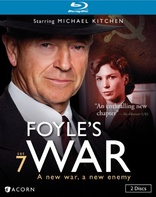
Movie rating
8.2 | / 10 |
Blu-ray rating
| Users | 4.5 | |
| Reviewer | 4.5 | |
| Overall | 4.5 |
Overview
Foyle's War: Set 7 (2013)
World War II is over, but the Cold War simmers in 1946. Christopher Foyle has retired from police work when Britain’s secret intelligence service, MI5, compels him to join its ranks. Relocated to London and reunited with his former colleague, newlywed Sam Wainwright, Foyle faces new—but no less deadly—threats in the world of spies and counterintelligence.
Starring: Michael Kitchen, Honeysuckle Weeks, Anthony HowellDirector: Jeremy Silberston, Stuart Orme, Gavin Millar, Tristram Powell, Giles Foster
| Drama | Uncertain |
| Period | Uncertain |
| Crime | Uncertain |
Specifications
Video
Video codec: MPEG-4 AVC
Video resolution: 1080p
Aspect ratio: 1.78:1
Original aspect ratio: 1.78:1
Audio
English: DTS-HD Master Audio 5.1 (48kHz, 16-bit)
Subtitles
English SDH
Discs
50GB Blu-ray Disc
Two-disc set (2 BDs)
Packaging
Slipcover in original pressing
Playback
Region A (B, C untested)
Review
Rating summary
| Movie | 5.0 | |
| Video | 4.5 | |
| Audio | 4.0 | |
| Extras | 4.0 | |
| Overall | 4.5 |
Foyle's War: Set 7 Blu-ray Movie Review
The Cold War Policeman
Reviewed by Michael Reuben September 22, 2013Acorn Media has released the first six sets of the British police drama Foyle's War on DVD, but Set 7 is the first to appear on Blu-ray. This isn't as odd as it sounds, because the three feature-length episodes in Set 7 are the first where Acorn acted as the show's co-producer. With these episodes, Foyle's War returned to the air after a three-year hiatus, having lost none of its popularity in either the U.K. or America, where it airs on PBS as part of Masterpiece Mystery. The latest episodes took the show in such an intriguing new direction that it could almost be called Foyle's War II. The first six sets of Foyle's War (which comprise seven "series" in the U.K., but try not to let that confuse you) ran on Britain's ITV from 2002 through 2010 and were so popular that public demand restored the show to the air after an initial cancellation in 2007. The title character is Detective Chief Superintendent (or "DCS") Christopher Foyle, a soft-spoken and self-effacing policeman in the coastal town of Hastings who has the peculiar job of investigating local crime while Britain fights for its survival in World War II. In the opening scene of the first episode, Foyle, who is every inch a patriot, applies for a military post and is rejected, because he is considered more valuable in his present job. Periodically throughout the show, he struggles with a sense of futility, as he investigates local cases of murder, theft and war profiteering while his country's future hangs in the balance across the Channel in Europe. But Foyle represents something important, which is why he became so popular. As created and largely written by Anthony Horowitz (Poirot and Midsomer Murders) and embodied by actor Michael Kitchen, best known to American audiences as M's chief of staff in GoldenEye and Tomorrow Never Dies, Foyle was a reminder of everything that the British military was fighting to preserve: justice, decency, tolerance, fair play and a clear sense of right and wrong. In a rare moment of open anger, Foyle expressed his innermost thoughts to a miscreant he'd arrested:
You know, I sometimes wonder why I do this job. And then I come across someone like you. I mean, we're living in such evil times, when the whole world seems to be sinking into some sort of mire. And as if Hitler wasn't enough, we've got the likes of you, who capitalize on other people's misery, who hurt them, make things even worse for them when they're at their weakest. And it's with the likes of you that this mire begins. And it's some small consolation to know that I've helped to clean up just a little bit of it.By the end of Set 6, however, the war had concluded, and Foyle had retired. His trusty sergeant, Paul Milner, had been promoted to Detective Inspector and assigned to Brighton, and his longtime driver and assistant, Samantha "Sam" Stewart, had married and settled into private life. Foyle left for America to pursue a suspect from one of his early cases, an American businessman whose importance to the British war effort had shielded him from a murder charge for which Foyle had conclusive evidence (Series 2, Episode 1, "Fifty Ships"). The decision was classic Foyle. Though modest, restrained and unfailingly polite in the traditional English fashion, Foyle notices everything, forgets nothing and never chooses the easy path over the right one. As a government official who has tangled with Foyle in the past warns an overconfident colleague: "He is not the provincial policeman you expected."
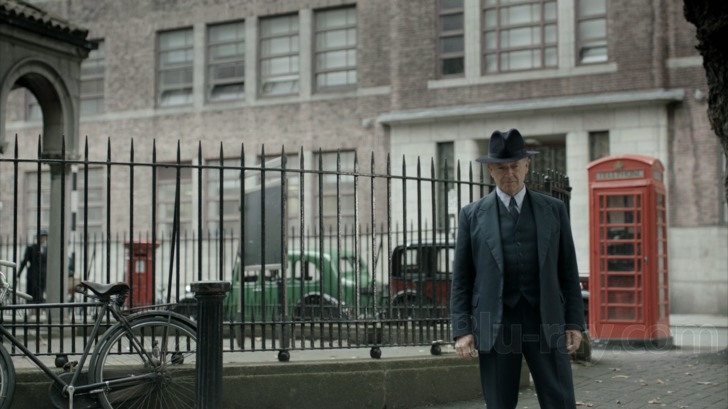
The Eternity Ring (first broadcast: Mar. 24, 2013, U.K.; Sept. 15, 2013, U.S.) In a prologue set in 1945, scientists successfully achieve the first detonation of an atomic bomb in the deserts of New Mexico. The team leader is a German scientist who fled the Nazis, Max Hoffman (Ken Bones), and the group includes an English colleague and his wife, Professor and Helen Fraser (Stephen Boxer and Kate Duchene). As they watch the mushroom cloud from their shelter, they congratulate each other on a historic achievement. In 1946, Christopher Foyle (Michael Kitchen) has just returned from America. As he disembarks at the docks in Liverpool, he is intercepted by Arthur Valentine (Tim McMullan) of MI5, the covert branch of British intelligence charged with defending the homeland. Valentine insists that Foyle accompany him but will not explain why. It turns out that Valentine's leash is being held by Hilda Pierce (Ellie Haddington), a formidable adversary with whom Foyle has tangled in the past. During the war, Pierce was a member of the Special Operations Executive, or SOE, which conducted espionage, reconnaissance and sabotage against the Nazis. Now she is a senior officer with MI5, reporting to Deputy Chief Sir William Chambers (Nicholas Jones). Pierce and Sir William ask Foyle to assist them in investigating a suspected group of Soviet agents attempting to steal nuclear secrets known as the "Eternity Ring". The Ring is believed to have connections to Professor Fraser, who now works at the Armwell Nuclear Research Facility outside London, along with Hoffman, an avowed communist sympathizer. When Foyle asks why he, a retired policeman, should involve himself in such matters, the MI5 officers reply that a police style of investigation is precisely what's called for. Then they provide him with a personal incentive: a photograph of his friend and former colleague, Sam (Honeysuckle Weeks), apparently handing an envelope to a known Soviet spy, Marc Vlessing (Nathan Gordon), outside the Old Vic Theater. Sam Wainwright, they tell him, using her married name, works as a secretary for Professor Fraser. She and her husband have become communist sympathizers. She appears to be part of the Eternity Ring. Though obviously skeptical, Foyle takes the assignment. He arranges to meet with Sam and, through her, is introduced to Professor Fraser, who invites him to dinner at his home with Professor Hoffman. Ever the methodical observer, Foyle begins to assemble a picture of the possible suspects, but before he can make sufficient progress, a major breach of security occurs at the Armwell Nuclear Research Facility. Has the Eternity Ring achieved its ultimate goal? Policemen are routinely lied to, and Foyle is a master of separating truth from deception. He does eventually solve the riddle of the Eternity Ring, clearing Sam in the process, and he accomplishes even more than his original assignment. Hilda Pierce, who already learned to respect the former Superintendent in their previous encounters, is so impressed that she offers him a permanent position with MI5. This presents Foyle with a dilemma. A job with MI5 was something he'd sought during the war, but he was turned down. Now, it's being offered to him with open arms, but the arms belong to one of the most treacherous people he's ever met. "I haven't got the requisite capacity for deceit", he tells Pierce. "Precisely!" she replies. "I need someone I can trust." Foyle doesn't trust Pierce for an instant, but he strikes a bargain for his services that benefits others, including Sam, who lost her job with Professor Fraser when he learned that Foyle was investigating him. Every episode of Foyle's War has subplots. "The Eternity Ring" includes the story of a former Hastings constable, Frank Shaw, who served on the force under Foyle but joined the military when war broke out. He was captured, held in a POW camp and only now, after six years, is returning to a family that barely remembers him. Shaw's struggle to reintegrate himself into a life and a country that no longer exist is a stark reminder of how drastically the war reshaped the British nation.


Foyle's War: Set 7 Blu-ray Movie, Video Quality 
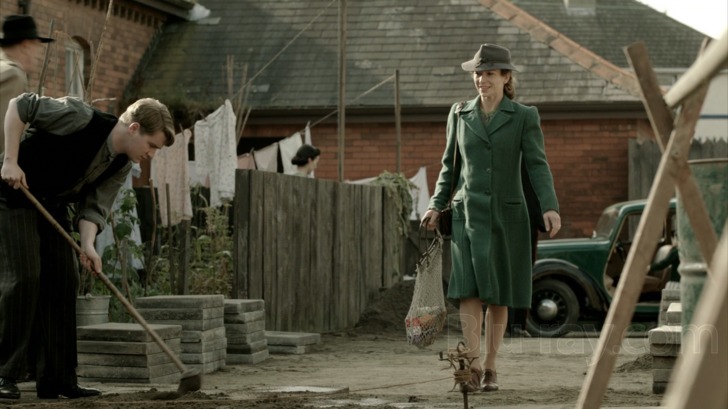
The three episodes of Foyle's War comprising Set 7 were shot with the Arri Alexa by Gavin Struthers, who was new to the world of Foyle but no stranger to historical British drama for television. (Struthers' other credits include the pilot for Endeavour and the second season of Downton Abbey.) As Set 7 is the first to be presented in hi-def and also represents an entirely new setting, it is difficult to compare to prior seasons. However, the series has always favored a desaturated palette with a predominantly brown cast that accentuates both the period look and the frayed conditions of Britain during the war. This same palette is appropriate for 1946, when, despite the Allied victory, supplies were short and conditions remained grim. Occasional bursts of bright color are provided by memories or flashbacks, such as the vivid recollections of sunflowers in the third episode, and some of the wardrobe of the female staff at MI5 shows more color than elsewhere. The interior of the "prefab" home occupied by Sam and Adam Wainwright is also considerably brighter; as explained in the extras, the dwelling was chosen to provide visual variety and also because it was historically accurate. An occasional side trip to a country setting provides a welcome refreshment of green. Detail is exceptional throughout, whether in long shots (e.g., the "typing pool" of assistants at MI5, where Sam is assigned a desk, or the field of sunflowers where Thomas Nelson's traumatized memory keeps returning, or the large airfield where an important investigation reaches its conclusion) or in closeups of Christopher Foyle's polite face and thoughtful eyes—or Hilda Pierce's iron face and chilly eyes. The Blu-ray appears to have been sourced from digital files with no intervening analog conversion, which would account for the complete absence of noise or interference. Acorn Media has elected to place all three episodes on a single BD-50, with the extras on a separate BD-25. I would have preferred, at their premium prices, two BD-50s, with the third episode, shifted to the second disc. Perhaps then the compressionist would not have been required to achieve the rather low average bitrate, for all three episodes, of 18.65 Mbps. Still, Acorn seems to have gotten away with it. One of the advantages of digital capture, from a compressionist's point of view, is that there isn't any film grain, which is one of the most common sources of compression artifacts. I saw none in Foyle's War.
Foyle's War: Set 7 Blu-ray Movie, Audio Quality 
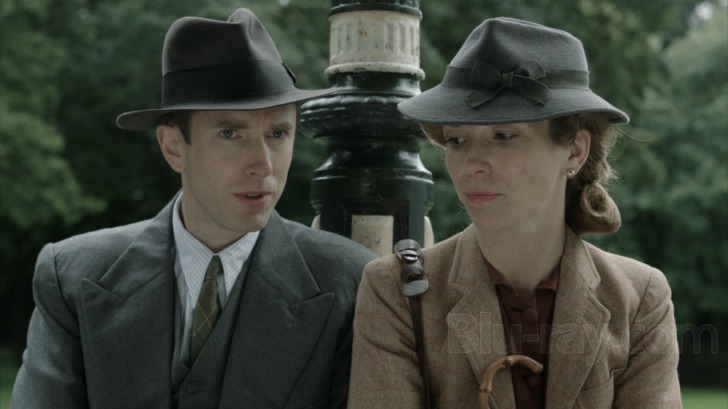
As best as I can tell, these are the first episodes of Foyle's War to be accompanied by a 5.1 soundtrack, supplied on Blu-ray in lossless DTS-HD MA. Previous episodes of the series were released in Dolby Digital 2.0. I can't be sure whether it was the lossless format or the 5.1 mix, but Foyle has never sounded more involving or immersive, although it is primarily a dialogue-driven series with its roots in the police procedural. Certainly there are scenes in these episodes where the multi-channel format gets an opportunity to flex its muscles. The hopeless last stand of the soldiers in the Ardennes in "Sunflower", and the events that follow, alternate between full sonic intensity and chilling silence. The portentous approach of an antique plane in a critical scene has an authentic and suspenseful roar and rattle. A nighttime raid on a secret facility—I cannot be more specific without spoilers—is full of subtle, and not-so-subtle sonic cues that add to the excitement, as alerts are sounded and the window of escape quickly narrows. An ambush of Foyle and another person by a hidden gunman is shocking and loud, both with gunfire and the sound of breaking glass. The thrust of Foyle's War, however, remains conversation between individuals, whether it's Foyle and Sam, Sam and Adam, or any of the various suspects, wrongdoers, bystanders or, in Adam's case, politicos and constituents. The soundtrack renders the dialogue with clarity, and fortunately for the American ear, none of the accents are thick. The three episodes were scored in the series' usual understated manner by Daniel Georgetti, returning from Set 6. (He also scored The Hour.) The main theme was composed by Jim Parker, creator of the memorable theme for Midsomer Murders, of which Horowitz was the principal writer in its early years.
Foyle's War: Set 7 Blu-ray Movie, Special Features and Extras 
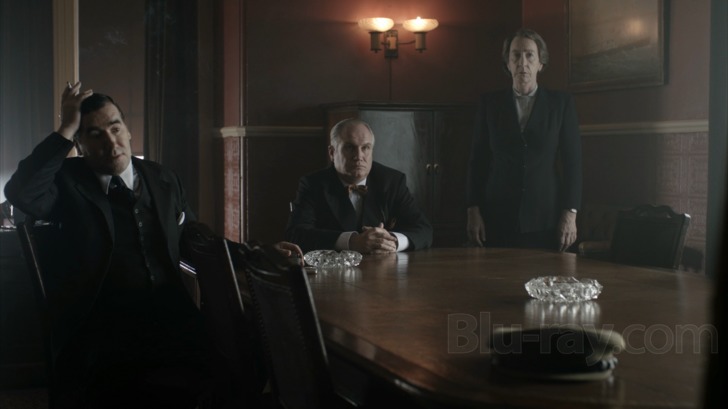
- Brief Series Recap (disc 1) (1080i; 1.78:1; 6:01): After a promotional lead-in featuring laudatory quotes from reviews, this featurette gets down to the business of presenting highlights of the first six "sets" in order to set up the beginning of Set 7.
- Anthony Horowitz Introductions (disc 1) (1080p; 1.78:1): Although these are billed as "Introductions", I suggest waiting until after viewing the episodes to watch them. Each segment provides historical background on the episode.
- The Eternity Ring (4:59)
- The Cage (4:45)
- Sunflower (5:15)
- The Making of Foyle's War (disc 2) (1080p, 1.78:1, unless otherwise indicated)
- Origins, On the Set, and More (26:58): Horowitz, executive producer Jill Green (who is married to Horowitz) and historical consultant Terry Charman of the Imperial War Museum discuss the origins of Foyle's War generally and the specific considerations involved in creating stories for the post-war years. Directors Stuart Orme ("The Eternity Ring" and "The Cage") and Andy Hay ("Sunflower") also participate, as do production designer Anna Rackard and various members of the props department regarding the challenges of recreating the London of 1946—which, as it turns out, is easier to do in Dublin, because almost none of that era's buildings exist in present-day London.
- Old Friends & New Faces (14:16): Several of the new regular cast are interviewed, including Tim McMullan ("Arthur Valentine"), Ellie Haddington ("Hilda Pierce"), Rupert Vansittart ("Sir Alec") and Nicholas Jones ("Sir William"). The returning cast participants are Honeysuckle Weeks ("Sam Wainwright") and Daniel Weyman ("Adam Wainwright").
- The Styling of Foyle's War (26:57): Hosted by Honeysuckle Weeks, this feature explores the care that went into recreating the hairstyles, makeup and clothing for the female characters in these episodes of Foyle's War, which was of particular importance for an era in which many women had entered the workplace while men were fighting overseas. At the same time, both fabrics and cosmetics were scarce commodities, which required inventive dressing for a professional look. (The so-called "coupon buster" shoe is a plot point in one episode.) In addition to Weeks, Alexandra Clatworthy ("Charlotte") participates, because her character is the MI5 assistant to whom Sam looks as a kind of role model.
- The Sunflower Massacre: Historical Facts, Visual Fictions (17:45): The Nazi atrocity depicted in the "Sunflower" episode is a composite of several incidents, which are described by Terry Charman of the Imperial War Museum. To create the graphic footage, director Andy Hay used a combination of practical and digital effects. Footage from the location shows the practical effects being rigged and filmed. Visual effects supervisor Barney Curnow then demonstrates how the practical effects are enhanced by small additions, such as muzzle flashes added to weapons that weren't actually fired and additional bullet hits and blood spray beyond what could safely be achieved with squibs. (This portion of the program is preceded by a warning about its graphic nature.)
- Photo Gallery (1080i; various; 2:03): A mixture of publicity stills and behind-the-scenes photos.
- Trailers: At startup, disc 1 plays trailers for Acorn Media, Case Histories and Miss Fisher's Murder Mysteries. These can be skipped with the chapter forward button and are not otherwise available once the disc loads.
Foyle's War: Set 7 Blu-ray Movie, Overall Score and Recommendation 

Foyle's War has consistently been one of British television's most popular detective series, and these three episodes, which may or may not be the last, are among the best to date, in large part because they introduce an innovative retooling of the format without sacrificing any of the qualities that made Foyle so beloved. Probably because it had a hand in producing these episodes, Acorn Media has been able to assemble one of the most feature-rich releases in its long history of providing British TV for American home video collectors. The Blu-ray edition of Foyle's War Set 7 is a worthy addition to any library, whether you're already a fan of Detective Foyle or are meeting him for the first time. Highest recommendation.
Similar titles
Similar titles you might also like
(Still not reliable for this title)

Allied 4K
2016

Poirot: Murder on the Orient Express
2010

The Americans: The Complete First Season
2013

The Night of the Generals
Limited Edition to 3000 - SOLD OUT
1967

Boardwalk Empire: The Complete Fifth Season
2014

The Shape of Water 4K
2017

Grantchester: Season Four
Masterpiece Mystery
2019

Aquarius: The Complete First Season
2015

The Paperboy
2012

There Will Be Blood
2007

They Call Me MISTER Tibbs!
1970

The Black Dahlia
2006

The Ipcress File
1965

Prime Suspect 3
1993

American Hustle 4K
10th Anniversary
2013

Road to Perdition
2002

Prime Suspect 6: The Last Witness
2003

Tinker Tailor Soldier Spy 4K
2011

A Perfect World
1993

Live by Night
2016
